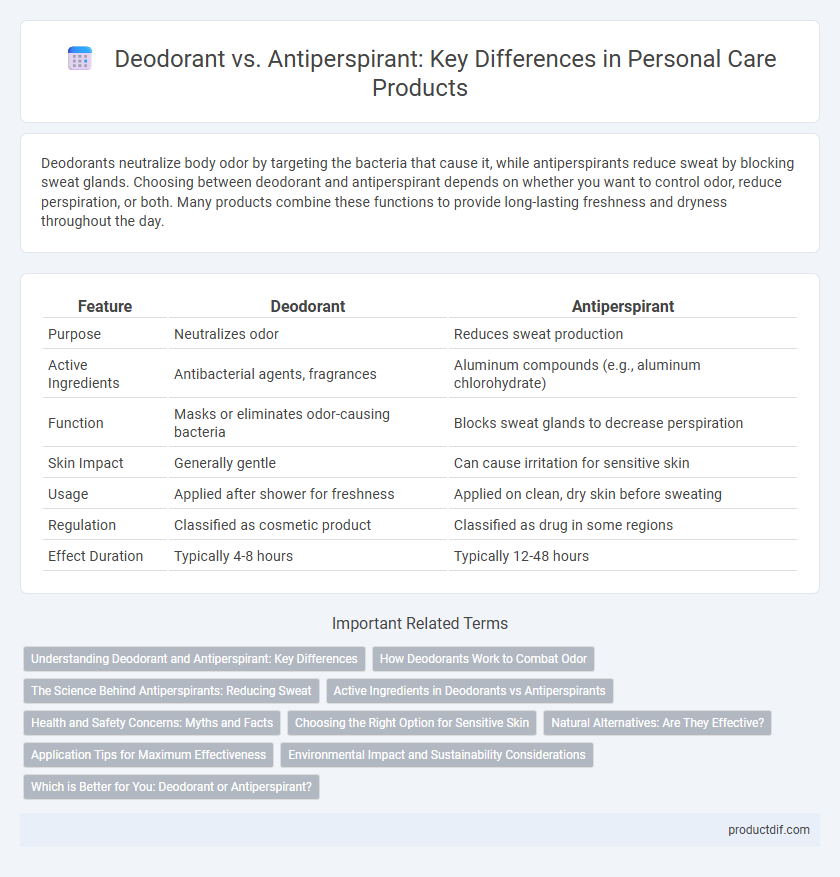Deodorants neutralize body odor by targeting the bacteria that cause it, while antiperspirants reduce sweat by blocking sweat glands. Choosing between deodorant and antiperspirant depends on whether you want to control odor, reduce perspiration, or both. Many products combine these functions to provide long-lasting freshness and dryness throughout the day.
Table of Comparison
| Feature | Deodorant | Antiperspirant |
|---|---|---|
| Purpose | Neutralizes odor | Reduces sweat production |
| Active Ingredients | Antibacterial agents, fragrances | Aluminum compounds (e.g., aluminum chlorohydrate) |
| Function | Masks or eliminates odor-causing bacteria | Blocks sweat glands to decrease perspiration |
| Skin Impact | Generally gentle | Can cause irritation for sensitive skin |
| Usage | Applied after shower for freshness | Applied on clean, dry skin before sweating |
| Regulation | Classified as cosmetic product | Classified as drug in some regions |
| Effect Duration | Typically 4-8 hours | Typically 12-48 hours |
Understanding Deodorant and Antiperspirant: Key Differences
Deodorants primarily neutralize odor-causing bacteria on the skin, providing a fresh scent without affecting perspiration. Antiperspirants contain active ingredients such as aluminum compounds that temporarily block sweat glands to reduce sweating and odor. Understanding these differences helps consumers choose products suited for odor control alone or for managing both sweat and odor effectively.
How Deodorants Work to Combat Odor
Deodorants combat odor by targeting the bacteria responsible for breaking down sweat into smelly compounds, using antimicrobial agents to inhibit bacterial growth. They often contain fragrances to mask body odor and ingredients that neutralize odor-causing molecules. Unlike antiperspirants, deodorants do not reduce sweating but focus solely on odor control through their antibacterial and scent-masking properties.
The Science Behind Antiperspirants: Reducing Sweat
Antiperspirants contain aluminum-based compounds that temporarily block sweat glands, reducing the amount of sweat released onto the skin. When applied, these compounds form a gel-like plug in the sweat ducts, effectively minimizing moisture and controlling body odor caused by bacterial breakdown of sweat. Clinical studies demonstrate that consistent use of antiperspirants can reduce sweating by up to 20-30%, making them effective for managing excessive perspiration and improving personal comfort.
Active Ingredients in Deodorants vs Antiperspirants
Deodorants use antimicrobial agents like triclosan or natural extracts such as tea tree oil to neutralize odor-causing bacteria without blocking sweat glands. Antiperspirants contain aluminum-based compounds like aluminum chlorohydrate or aluminum zirconium, which temporarily block sweat ducts to reduce perspiration. The choice of active ingredients determines whether a product primarily controls odor or sweat production.
Health and Safety Concerns: Myths and Facts
Deodorants primarily mask body odor by targeting bacteria, while antiperspirants reduce sweat by blocking sweat glands with aluminum-based compounds. Health concerns regarding antiperspirants causing breast cancer or Alzheimer's lack strong scientific evidence, as extensive studies by the American Cancer Society and Alzheimer's Association confirm safety when used as directed. Consumers should choose products based on personal sensitivity and consult dermatologists if irritation or allergies occur.
Choosing the Right Option for Sensitive Skin
When selecting a personal care product for sensitive skin, choosing a deodorant without aluminum-based compounds reduces the risk of irritation and allergic reactions. Antiperspirants contain aluminum chlorohydrate or aluminum zirconium which temporarily block sweat glands but may cause redness or itching in sensitive skin types. Hypoallergenic deodorants with natural ingredients like witch hazel or aloe vera offer odor control without compromising skin comfort and health.
Natural Alternatives: Are They Effective?
Natural deodorants often use ingredients like baking soda, arrowroot powder, and essential oils to absorb moisture and neutralize odor without blocking sweat glands. While they effectively reduce odor, they do not prevent sweating like antiperspirants, which contain aluminum-based compounds to temporarily block sweat pores. Consumers seeking chemical-free options should consider that natural alternatives prioritize odor control but may require more frequent reapplication for optimal effectiveness.
Application Tips for Maximum Effectiveness
Apply deodorant to clean, dry skin to neutralize odor-causing bacteria effectively, while antiperspirant should be used at night to allow aluminum-based compounds to block sweat glands overnight. Avoid shaving immediately before application to prevent irritation and enable better absorption. Reapply deodorant as needed throughout the day, but limit antiperspirant use to once daily for optimal sweat control without skin discomfort.
Environmental Impact and Sustainability Considerations
Deodorants primarily mask odor without blocking sweat glands, often containing fewer harmful chemicals, while antiperspirants use aluminum-based compounds that can persist in the environment and contribute to water pollution. Sustainable personal care brands increasingly favor natural deodorant formulations with biodegradable ingredients and eco-friendly packaging to minimize ecological footprints. Choosing aluminum-free, cruelty-free, and compostable packaging options reduces plastic waste and supports healthier ecosystems.
Which is Better for You: Deodorant or Antiperspirant?
Deodorants neutralize odor by targeting bacteria on the skin, while antiperspirants reduce sweat by blocking sweat glands with aluminum-based compounds. Choosing between deodorant and antiperspirant depends on your specific needs: deodorant is ideal for odor control without affecting sweat, whereas antiperspirant provides both sweat reduction and odor prevention. For sensitive skin or certain health concerns, deodorants with natural ingredients may be a better option, while those seeking maximum sweat control often prefer clinical-strength antiperspirants.
Deodorant vs Antiperspirant Infographic

 productdif.com
productdif.com